
Ever dreamt of navigating the thrilling world of finance like a seasoned pro? Pennsylvania, a state brimming with industry giants and financial powerhouses, could be the launchpad for your meteoric rise! But with so many MBA programs competing for your attention, choosing the right one can feel like deciphering a complex financial instrument.
Fear not, future financial wizards! This exclusive guide unveils the Top 10 Finance MBA programs in Pennsylvania for 2024, meticulously curated to empower your ascent to the top.
Get ready to dive deep into prestigious institutions, industry-focused curriculums, and unparalleled networking opportunities that will propel you toward your dream career.
So, buckle up, sharpen your financial acumen, and let’s unlock the secrets to success in the Keystone State’s vibrant financial landscape!
You may like to read: Top 10 Finance MBA Programs in USA 2024
Why Study Finance MBA Programs in Pennsylvania?
Pennsylvania isn’t called the “Keystone State” for nothing. It’s a cornerstone of American finance, full of opportunities for aspiring financial experts. Here’s a look at why a Finance MBA in Pennsylvania could unlock your potential:
- Powerhouse Industry Hub:
Pennsylvania is a financial giant, home to companies like Vanguard, PNC Financial Services, and Liberty Mutual. Being close to these industry leaders means you get top-notch internship and job placement opportunities. You’ll gain real-world experience and build a network from day one.
- Renowned Academic Excellence:
Pennsylvania has some of the nation’s best business schools, such as Wharton, Tepper, and Fox. These schools have rigorous curriculums taught by top faculty, ensuring you graduate with the skills needed in today’s financial world.
- Diverse Program Offerings:
Whether you’re into investment banking, corporate finance, financial modeling, or fintech, Pennsylvania’s MBA programs have something for you. Some even offer specializations in areas like risk management or quantitative finance, letting you find your unique place in the industry.
- Networking Goldmine:
Pennsylvania’s business schools have strong alumni networks. You’ll have access to successful professionals who can mentor you, give career advice, and help you find job opportunities. These connections are crucial for making it in finance.
- Cost-Effective Options:
While some programs are expensive, Pennsylvania also has great public universities and smaller business schools with lower tuition fees. This makes getting a top-tier Finance MBA more affordable, letting you invest in your future without too much debt.
- Live, Learn, and Thrive:
Cities like Philadelphia and Pittsburgh offer vibrant cultural attractions, diverse communities, and a lively social scene. You can balance academics with a rich personal life, making your educational journey enjoyable and well-rounded.
- Launchpad for Diverse Careers:
A Finance MBA in Pennsylvania opens doors to many exciting career paths. You could work in investment banking, analyze financial data for a multinational company, or even start your own business. The options are endless.
- Gateway to Global Finance:
Pennsylvania’s financial institutions have a global presence. Your MBA could lead to a career abroad in financial centers like London, Hong Kong, or Singapore. This international exposure can give you a competitive edge in the global market.
Overview of Top 10 Finance MBA Programs in Pennsylvania (2024)
Pennsylvania offers a strong selection of Finance MBA programs, ranging from elite institutions to affordable options with high ROI.
1. Wharton School of the University of Pennsylvania

Wharton’s Finance MBA is considered the gold standard in the industry. The program offers a rigorous curriculum emphasizing quantitative analysis, financial modeling, and investment strategies.
With a wide range of electives, students can specialize in corporate finance, investment banking, or real estate finance. The esteemed faculty includes industry experts and Nobel laureates, ensuring top-notch education.
Why Wharton?
- Unparalleled Reputation: Consistently ranked #1 by BusinessWeek and U.S. News & World Report.
- World-Class Faculty: Learn from Nobel laureates and industry leaders.
- Extensive Resources: Access to cutting-edge research centers and financial databases.
- Global Network: Vast alumni network with connections in top financial institutions worldwide.
- Diverse Career Options: Opportunities in investment banking, private equity, hedge funds, or consulting.
Features:
- Wharton Leadership Development Program: Enhance essential leadership skills.
- Semester in San Francisco: Experience the West Coast tech and finance scene.
- Global Immersion Experiences: Participate in intensive learning opportunities abroad.
- Wharton Fellows Program: Merit-based scholarships available.
- Multiple Specialization Options: Customize your program to match your interests.
Admission Requirements:
- Minimum Education: Bachelor’s degree from an accredited institution.
- Average GPA: 3.8+ (highly competitive).
- GMAT or GRE Score: 730+ GMAT or equivalent GRE score (highly competitive).
- Language Test Scores: IELTS (88+), TOEFL (108+), Duolingo (135+) (requirements may vary for international students).
2. Tepper School of Business, Carnegie Mellon University

Tepper’s Finance MBA focuses on a data-driven approach, combining quantitative analysis with practical applications.
The program provides a solid foundation in financial theory, with electives available in areas like computational finance or fintech.
Tepper is known for its collaborative learning environment and strong alumni network in Pittsburgh.
Why Tepper?
- Analytics-Driven Approach: Gain expertise in data analysis and financial modeling.
- Strong Alumni Network: Extensive connections in Pittsburgh’s financial institutions.
- Entrepreneurial Focus: Ideal for aspiring financial entrepreneurs.
- Flexible Curriculum: Customize your program with various electives and specializations.
- Strong International Reputation: Diverse student body fostering a global perspective.
Features:
- Tepper Quantitative Institute: Develop advanced quantitative skills for finance.
- Action Learning Projects: Apply classroom knowledge to real-world business problems.
- Global Business Programs: Immerse yourself in international business through study abroad opportunities.
- Dual Degrees: Combine the MBA with other disciplines like engineering or computer science.
- Financial Technology Specialization: Gain expertise in the rapidly evolving fintech sector.
Admission Requirements:
- Minimum Education: Bachelor’s degree from an accredited institution.
- Average GPA: 3.6+ (competitive).
- GMAT or GRE Score: 680+ GMAT or equivalent GRE score (competitive).
- Language Test Scores: IELTS (7.0+), TOEFL (100+), Duolingo (125+) (requirements may vary for international students).
3. Fox School of Business and Management, Temple University
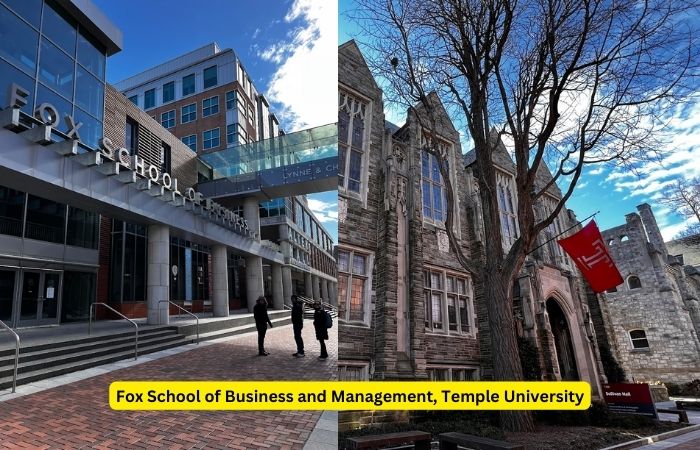
Temple’s Fox School offers a comprehensive Finance MBA program that emphasizes real-world application. Students gain hands-on experience through internships, case studies, and simulations.
The program provides a solid foundation in financial theory and analysis, with electives allowing for specialization in areas like corporate finance or investment management.
Why Fox?
- Location Advantage: Situated in Philadelphia, a major financial hub with numerous job opportunities.
- Focus on Practical Skills: Gain hands-on experience through internships and real-world projects.
- Affordable Tuition: Competitive tuition compared to other top programs.
- Strong Alumni Network: Extensive connections in the Philadelphia and Mid-Atlantic financial scene.
- Evening and Weekend Options: Flexible program options for working professionals.
Features:
- Fox Trading Room: Develop your trading skills in a simulated market environment.
- Financial Management Center: Gain practical experience by managing a real-world investment portfolio.
- Global Immersion Programs: Participate in short-term international experiences focused on finance.
- Dual Degrees: Combine the MBA with other disciplines like law or engineering.
- Part-Time and Executive MBA Options: Cater to working professionals seeking career advancement.
Admission Requirements:
- Minimum Education: Bachelor’s degree from an accredited institution.
- Average GPA: 3.3+ (competitive).
- GMAT or GRE Score: 600+ GMAT or equivalent GRE score (competitive).
- Language Test Scores: IELTS (7.0+), TOEFL (100+), Duolingo (120+) (requirements may vary for international students).
You may like to read: Top 5 Finance MBA Programs in California (2024 Updated)
4. Smeal College of Business, Pennsylvania State University

Penn State’s Smeal College offers a highly regarded Finance MBA program with a strong emphasis on financial theory and quantitative analysis.
The program provides a broad foundation in all areas of finance, preparing students for diverse career paths. Smeal boasts a vibrant student body and a strong alumni network worldwide.
Why Smeal?
- Strong Reputation: Renowned program with a long history of excellence in business education.
- Quantitative Focus: Develop advanced analytical skills for financial decision-making.
- Diverse Program Options: Choose from full-time, part-time, and online MBA formats.
- Global Learning Opportunities: Participate in study abroad programs and international business competitions.
- Entrepreneurial Spirit: Smeal fosters an innovation mindset, ideal for aspiring financial entrepreneurs.
Features:
- Center for Business Analytics: Develop expertise in data analysis and financial modeling.
- Financial Markets Lab: Gain hands-on experience with trading software and investment strategies.
- Global Engagement Programs: Immerse yourself in international business through study abroad opportunities.
- Penn State World Campus: Earn your MBA online with a flexible format.
- Fast-Track MBA: Complete the program in an accelerated 12-month format.
Admission Requirements:
- Minimum Education: Bachelor’s degree from an accredited institution.
- Average GPA: 3.2+ (competitive).
- GMAT or GRE Score: 600+ GMAT or equivalent GRE score (competitive).
- Language Test Scores: IELTS (7.0+), TOEFL (100+), Duolingo (120+) (requirements may vary for international students).
5. LeBow College of Business, Drexel University
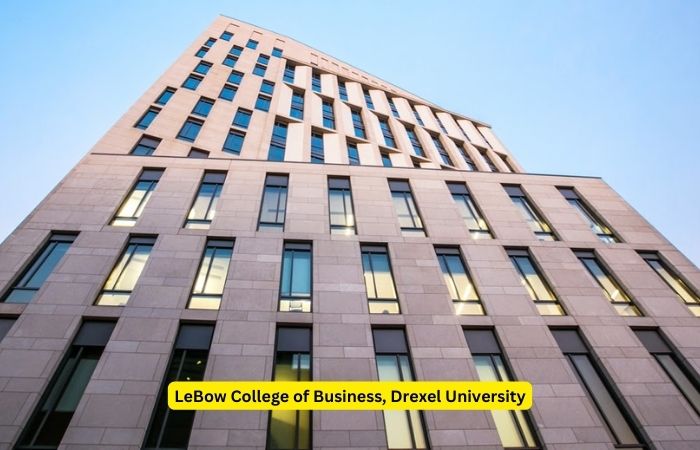
Drexel’s LeBow College offers both full-time and part-time MBA programs with a finance concentration.
The program emphasizes experiential learning through internships, case studies, and real-world projects.
Students gain a solid foundation in financial theory and analysis, with electives available in areas like investment banking and financial risk management.
Why LeBow?
- Experiential Learning: Gain hands-on experience through internships and co-op programs.
- Flexible Program Options: Full-time and part-time formats to suit diverse needs.
- Location Advantage: Located in Philadelphia, a major financial hub with many job opportunities.
- Strong Industry Connections: LeBow has a network of corporate partners for internships and job placements.
- Entrepreneurial Focus: Develop skills for launching or managing a financial startup.
Features:
- Co-op Program: Earn valuable work experience while completing your MBA.
- Financial Markets Lab: Get hands-on experience with trading software and investment strategies.
- Corporate Immersion Programs: Participate in short-term projects with leading financial institutions.
- Evening and Weekend Programs: Options for working professionals seeking career advancement.
- Entrepreneurship Concentration: Gain the skills and knowledge to launch your own venture.
Admission Requirements:
- Minimum Education: Bachelor’s degree from an accredited institution.
- Average GPA: 3.0+ (competitive).
- GMAT or GRE Score: 550+ GMAT or equivalent GRE score (competitive).
- Language Test Scores: IELTS (7.0+), TOEFL (100+), Duolingo (120+) (requirements may vary for international students).
6. Charles Widger School of Business, Villanova University
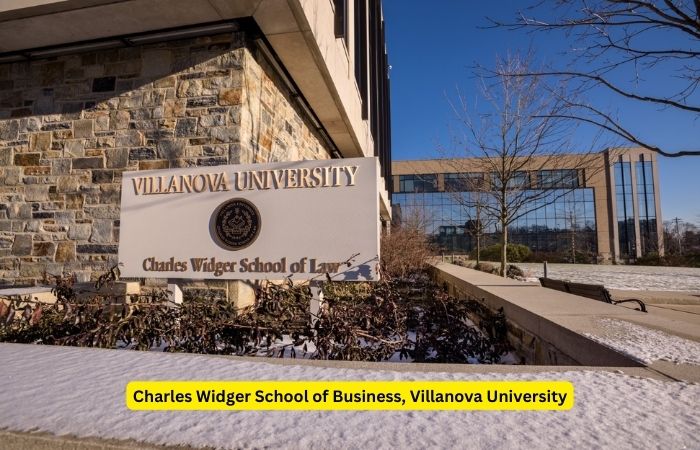
Villanova’s Charles Widger School offers a full-time MBA program with a finance specialization.
The program provides a solid foundation in financial theory and analysis, with electives in areas like corporate finance and investment management.
Villanova emphasizes a collaborative learning environment and ethical leadership principles.
Why Villanova?
- Strong Ethics Focus: Develop your skills as a responsible and ethical financial leader.
- Collaborative Learning: Build strong relationships with classmates through teamwork and group projects.
- Emphasis on Communication: Enhance your communication skills to effectively present financial analysis.
- Catholic Tradition: Villanova promotes a values-based approach to business.
- Mid-Atlantic Location: Access career opportunities in Philadelphia and the surrounding region.
Features:
- Center for Business Ethics: Enhance your ethical decision-making skills in a business context.
- Investment Simulation Competition: Gain practical experience managing a simulated investment portfolio.
- International Business Immersion Trips: Participate in short-term study abroad programs focused on global business.
- Leadership Development Programs: Develop your leadership skills for a successful career.
- Smaller Class Sizes: Benefit from personalized attention and faculty interaction.
Admission Requirements:
- Minimum Education: Bachelor’s degree from an accredited institution.
- Average GPA: 3.2+ (competitive).
- GMAT or GRE Score: 600+ GMAT or equivalent GRE score (competitive).
- Language Test Scores: IELTS (7.0+), TOEFL (100+), Duolingo (120+) (requirements may vary for international students).
7. School of Business, La Salle University
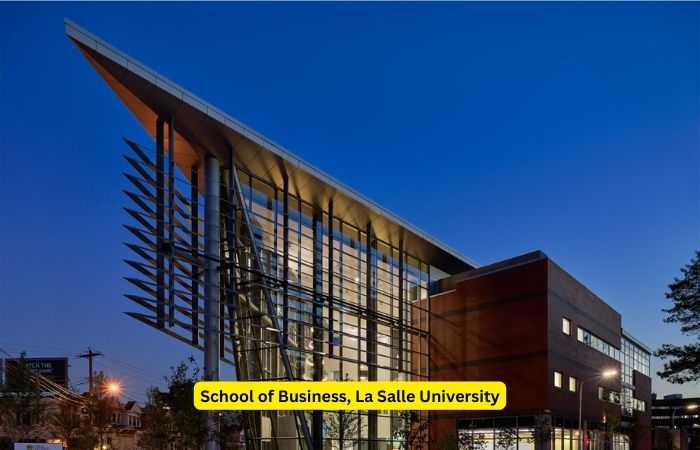
La Salle University’s School of Business offers both full-time and part-time MBA programs with a focus on finance.
The program provides a comprehensive curriculum covering essential areas of finance, allowing students to tailor their studies through electives.
La Salle emphasizes ethical decision-making and social responsibility, preparing graduates with a strong moral foundation for successful careers.
Why La Salle?
- Emphasis on Ethics and Social Responsibility: Understand the ethical implications of financial decisions.
- Flexible Program Options: Full-time and part-time formats to suit diverse needs.
- Strong Core Curriculum: Solid foundation in all areas of finance.
- Smaller Class Sizes: Personalized attention and faculty interaction.
- Focus on Practical Skills: Develop the necessary skills for workplace success.
Features:
- Center for Business Ethics: Enhance your understanding of ethical business practices.
- Financial Modeling and Valuation Course: Develop critical skills for corporate finance careers.
- Investment Analysis Course: Gain expertise in analyzing financial markets and making investment decisions.
- Evening and Weekend Programs: Options for working professionals seeking career advancement.
- International Business Electives: Broaden your perspective with courses focused on global financial markets.
Admission Requirements:
- Minimum Education: Bachelor’s degree from an accredited institution.
- Average GPA: 3.0+ (competitive).
- GMAT or GRE Score: 500+ GMAT or equivalent GRE score (competitive).
- Language Test Scores: IELTS (6.5+), TOEFL (88+), Duolingo (115+) (requirements may vary for international students).
8. Erivan K. Haub School of Business, Saint Joseph’s University
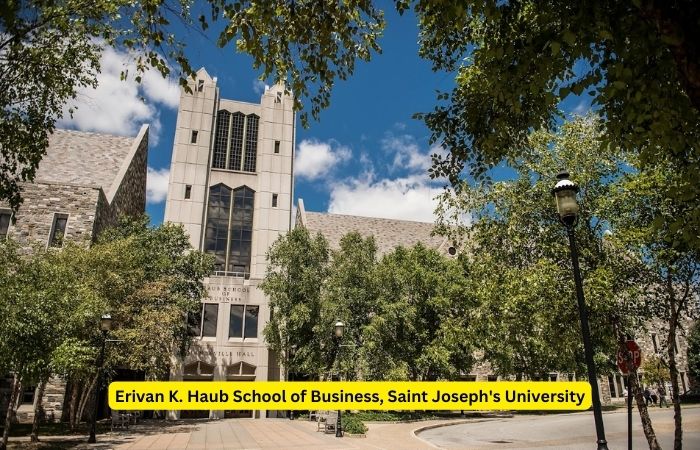
The Haub School at Saint Joseph’s University offers a full-time MBA program with a finance concentration.
The program emphasizes a data-driven approach, integrating quantitative analysis with core financial concepts.
Students gain practical experience through internships, case studies, and simulations. The program fosters a collaborative learning environment, preparing graduates for diverse financial careers.
Why Saint Joseph’s?
- Data-Driven Approach: Develop advanced analytical skills for financial decision-making.
- Focus on Practical Application: Gain hands-on experience through internships and real-world projects.
- Collaborative Learning Environment: Build strong relationships through teamwork and group projects.
- Jesuit Values: Develop ethical and social responsibility alongside financial skills.
- Strong Alumni Network: Access connections in Philadelphia and the Mid-Atlantic financial scene.
Features:
- Financial Markets Simulation Lab: Experience trading strategies and risk management in a simulated environment.
- Center for Applied Financial Analysis: Engage in research projects with faculty and industry partners.
- Global Business Immersion Programs: Participate in short-term study abroad experiences focused on international business.
- Leadership Development Programs: Hone your leadership skills for a successful career.
- Smaller Class Sizes: Benefit from personalized attention and faculty interaction.
Admission Requirements:
- Minimum Education: Bachelor’s degree from an accredited institution.
- Average GPA: 3.0+ (competitive).
- GMAT or GRE Score: 550+ GMAT or equivalent GRE score (competitive).
- Language Test Scores: IELTS (7.0+), TOEFL (100+), Duolingo (120+) (requirements may vary for international students).
9. School of Business, Robert Morris University (RMU)
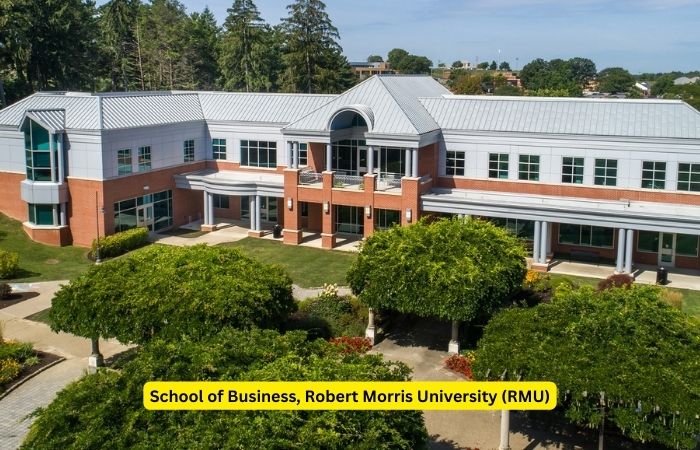
RMU’s School of Business offers both full-time and part-time MBA programs with a focus on finance.
The program emphasizes practical application, featuring internships, case studies, and simulations.
Students gain a solid foundation in financial theory and analysis, with electives for specialization in areas like corporate finance or investment management. RMU has a strong alumni network in the Pittsburgh region.
Why RMU?
- Affordable Tuition: Competitive costs compared to other top programs in Pennsylvania.
- Focus on Practical Skills: Hands-on experience through internships and real-world projects.
- Flexible Program Options: Full-time and part-time formats to meet diverse student needs.
- Strong Alumni Network: Access connections in Pittsburgh’s financial scene.
- Small Class Sizes: Benefit from personalized attention and faculty interaction.
Features:
- Financial Modeling and Valuation Course: Develop skills critical for corporate finance careers.
- Investment Analysis Course: Gain expertise in analyzing financial markets and making investment decisions.
- Real Estate Finance Concentration: Deepen your knowledge of the real estate market and its financial aspects.
- Evening and Weekend Programs: Options for working professionals seeking career advancement.
- Accelerated Program: Complete the program in as few as 12 months.
Admission Requirements:
- Minimum Education: Bachelor’s degree from an accredited institution.
- Average GPA: 3.0+ (competitive).
- GMAT or GRE Score: 500+ GMAT or equivalent GRE score (requirements may vary depending on your background).
- Language Test Scores: IELTS (6.5+), TOEFL (88+), Duolingo (115+) (requirements may vary for international students).
10. Donahue Graduate School of Business, Duquesne University
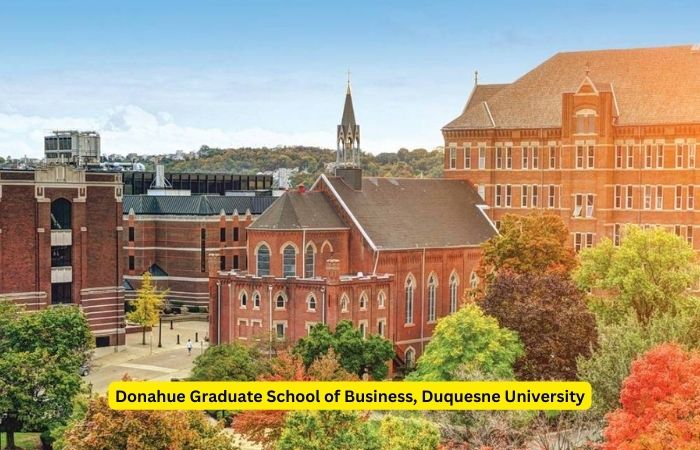
Duquesne’s Donahue School offers both full-time and part-time MBA programs with a finance concentration. The program provides a solid foundation in financial theory and quantitative analysis, preparing students for diverse career paths. Duquesne offers a STEM-designated MBA with a focus on data analytics, making it ideal for those interested in this growing field within finance.
Why Duquesne?
- STEM-Designated Program: Gain valuable data analytics skills highly sought after in the finance industry.
- Strong Reputation: Renowned program with a long history of excellence in business education.
- Focus on Quantitative Analysis: Develop advanced analytical skills for financial decision-making.
- Flexible Program Options: Full-time and part-time formats cater to working professionals.
- Strong Alumni Network: Extensive connections in the Pittsburgh and Mid-Atlantic financial scene.
Features:
- Center for Excellence in Financial Analysis: Gain practical experience through research and real-world projects.
- FinTech Lab: Explore the intersection of finance and technology.
- Global Business Programs: Participate in international experiences focused on finance.
- Evening and Weekend Programs: Options for working professionals seeking career advancement.
- STEM Designation: Benefit from potential immigration benefits for international students.
Admission Requirements:
- Minimum Education: Bachelor’s degree from an accredited institution.
- Average GPA: 3.2+ (competitive).
- GMAT or GRE Score: 600+ GMAT or equivalent GRE score (competitive).
- Language Test Scores: IELTS (7.0+), TOEFL (100+), Duolingo (120+) (requirements may vary for international students).
You may like to read: Top 10 Finance MBA Programs in Boston, Massachusetts (2024)
Career Paths After a Pennsylvania Finance MBA
A Pennsylvania Finance MBA opens doors to a dynamic and rewarding career in finance, equipped with essential knowledge, skills, and a robust network. Here’s a breakdown of promising career paths you can pursue after graduating from a top Pennsylvania program:
Investment Banking:
- Ideal for: Highly analytical individuals with strong communication and interpersonal skills.
- Responsibilities: Underwrite financial transactions, advise on mergers and acquisitions, and raise capital through public offerings.
- Top Pennsylvania Employers: JPMorgan Chase, Morgan Stanley, Wells Fargo Securities (Philadelphia and/or Pittsburgh).
Private Equity:
- Ideal for: Individuals skilled in financial modeling and business strategy.
- Responsibilities: Invest in private companies, manage portfolio companies, and maximize shareholder value.
- Top Pennsylvania Employers: Warburg Pincus (Philadelphia), Greenbriar Equity Partners (Pittsburgh).
Venture Capital:
- Ideal for: Entrepreneurial individuals with a passion for emerging technologies.
- Responsibilities: Invest in high-growth startups, provide mentorship, and achieve successful exits.
- Top Pennsylvania Employers: First Round Capital (Philadelphia), BV Investment Partners (Philadelphia).
Corporate Finance:
- Ideal for: Analysts with strong financial modeling skills in a corporate setting.
- Responsibilities: Analyze financial data, manage budgets, and provide strategic recommendations.
- Top Pennsylvania Employers: Comcast (Philadelphia), PPG Industries (Pittsburgh), Hershey Company (Hershey).
Financial Planning & Analysis (FP&A):
- Ideal for: Individuals proficient in financial analysis and forecasting.
- Responsibilities: Develop financial plans, analyze data, and support strategic decision-making.
- Top Pennsylvania Employers: U.S. Steel Corporation (Pittsburgh), Exelon Corporation (Pennsylvania), Merck & Co. (Pennsylvania).
Other Promising Paths:
- Hedge Funds: Manage portfolios for high-net-worth clients.
- Real Estate Finance: Analyze property values and finance real estate projects.
- Risk Management: Identify and mitigate financial risks.
- Financial Consulting: Provide advice to diverse clients on financial matters.
These career paths leverage the diverse skills and specialized knowledge gained through a Pennsylvania Finance MBA, positioning graduates for success in the competitive landscape of finance.
You may like to read: Top 9 Finance MBA Programs in New York City, New York 2024
Pennsylvania Finance MBA Programs (2024) University Comparison:
| University | Program Length | Cost of Living | Gross Tuition | Application Fee | Location | Website URL |
|---|---|---|---|---|---|---|
| University of Pennsylvania | 2 years (Full-time) | High | $162,060 | $265 | Philadelphia, PA | Wharton School |
| Carnegie Mellon University | 2 years (Full-time) | High | $142,000 | $200 | Pittsburgh, PA | Tepper School |
| Temple University | 2 years (Full-time) | High | $95,000 | $60 | Philadelphia, PA | Fox School |
| Pennsylvania State University | 2 years (Full-time) | Medium | $91,722 | $65 | State College, PA | Smeal College |
| Drexel University | 2 years (Full-time) | High | $100,728 | $65 | Philadelphia, PA | LeBow College |
| Villanova University | 2 years (Full-time) | High | $100,400 | $65 | Villanova, PA | Charles Widger School |
| La Salle University | 2 years (Full-time) | Medium | $71,580 | $35 | Philadelphia, PA | La Salle School of Business |
| Saint Joseph’s University | 2 years (Full-time) | Medium | $92,720 | $60 | Philadelphia, PA | Erivan K. Haub School |
| Robert Morris University | 2 years (Full-time) | Medium | $64,800 | $50 | Pittsburgh, PA | RMU School of Business |
| Duquesne University | 2 years (Full-time) | High | $92,250 | $50 | Pittsburgh, PA | Donahue School |
Conclusion
Pennsylvania is a financial giant, home to companies like Vanguard, PNC Financial Services, and Liberty Mutual. The state offers top-notch internship and job placement opportunities, rigorous curriculums taught by top faculty, and strong alumni networks. The top 10 Finance MBA programs in Pennsylvania for 2024 include Wharton, Tepper, Fox, Smeal, LeBow, and Villanova, each offering unique features and specializations to empower aspiring financial experts.
